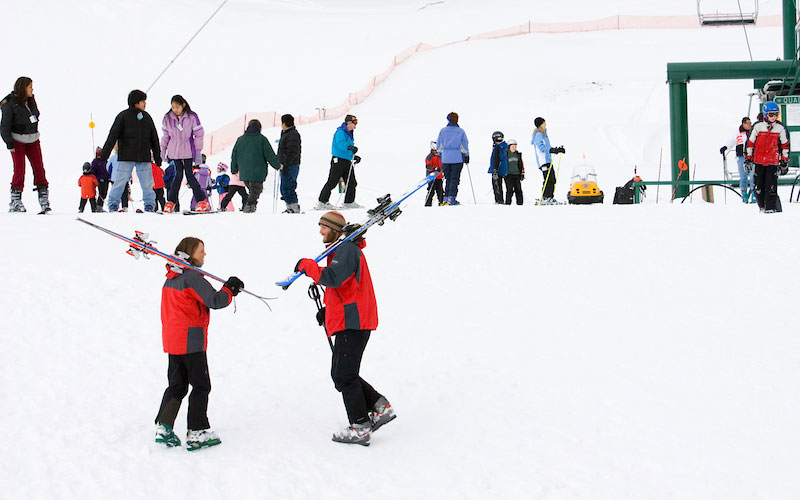
Climate disruption is causing havoc for ski areas and other winter industries across New England. Photo: EcoPhotography
I’m an avid skier, so even this past weekend’s bone-chilling temps didn’t stop me from getting out on the slopes. On Friday and Saturday, I bundled up with every warming trick I know, including heated gloves, several foot warmers, and as many layers as I could squeeze under my jacket and snow pants. But then, by Sunday afternoon, the temps rebounded from below zero to the high 30s in a matter of hours.
I’ve lived in New England my entire life and have been skiing for over a decade. Sure, temperature fluctuations happen, but I’m seeing those fluctuations grow more frequent and extreme, especially in the winter.
In an increasingly warming world, temperatures are rising faster in New England than on the rest of the planet. And our winters are paying the price – becoming shorter with less snow and less predictable weather patterns. That’s a distressing omen of what our local winter sports economy might look like very soon, and it’s the talk of every mountain I’ve been to in recent years.
A Global Problem with Local Impacts
Skiing in New England is a truly unique experience. While I’m a bit biased having grown up here, I’ll give Vermont, New Hampshire, and Maine the edge over the mountains out west any day. We’re able to fly down soft groomed trails, challenge ourselves with some powdery bumps and moguls, and, yes, sharpen our carving skills with icy runs at the end of the day. Living in Boston, I’m lucky to have access to some of the best mountains in the Northeast within a few hours’ drive from my house.
Over the last few years, though, I’ve seen the conditions at these mountains vary widely from season to season and even from week to week. Some years, 100 or more inches of snow falls and largely sticks around, providing a great ski season that lasts into April. In other years, only a fraction of that falls, and resorts rely on snowmaking to keep just a few trails open into March.
It’s a common conversation among skiers and riders to connect these changing conditions to the impacts of climate change. It’s hard not to notice the effects of a warming world on our favorite mountains. The impacts fall hardest on the ski areas themselves, of course. Researchers noted that during the lowest annual snowfall years between 2011 and 2016, the winter sports industry lost 17,400 jobs each year.
That’s huge, especially when we realize how vital the ski industry is nationally and locally. The snow sports industry is worth almost $20 billion nationally. Not to mention, northern New England heavily relies on winter sports revenue, including skiing and other winter tourism, to sustain its economy.
Winter Sports Are Just One Sign that Climate Change Is Here
The impact on winter sports is just one of the many signs that the climate crisis isn’t a future problem. It’s truly a now problem, and skiing won’t be the only area to see substantial impacts. Winter industries that depend on sustained cold temperatures also stand to suffer if warming continues unabated. Maple sugaring is just one example. Vermont often produces the most maple syrup in the country, followed by New York and Maine. It’s a massive part of New England’s economy, worth $129.5 million nationally in 2019. But wild fluctuations in winter temperatures put maple sugaring at serious risk in the coming years, alongside other winter industries and even farming.
As I write this, it’s nearly 50 degrees outside in early February. A few days ago, the temperature dropped to -21 degrees in Killington, Vermont, with wind chill readings plunging toward -50.
Fortunately, solutions here at home can help confront this global threat. Most importantly, we must prioritize transitioning to clean energy sources like solar and wind. Our dirty and expensive addiction to fossil fuels is causing most planet-warming emissions. We must end our reliance on them as soon as possible.
Five of our six New England states have begun that process by passing laws that mandate deep cuts to climate-damaging pollution. These mandates put us on a path to reach net-zero emissions by 2050. It’s time for the rest of our region (and the country) to catch up and do the same.
I often think about how much skiing means to me. How many memories I have of the majestic slopes and curves of New England’s mountains. It’s not just the wintry adventures I love that are in peril, but the iconic New England pastimes, industries, and communities that depend on snowbound winters, too.
The time to act is now before the situation gets any worse. We must push our leaders to treat the climate crisis with the urgency it demands before our favorite winter activities are no longer possible in New England.



